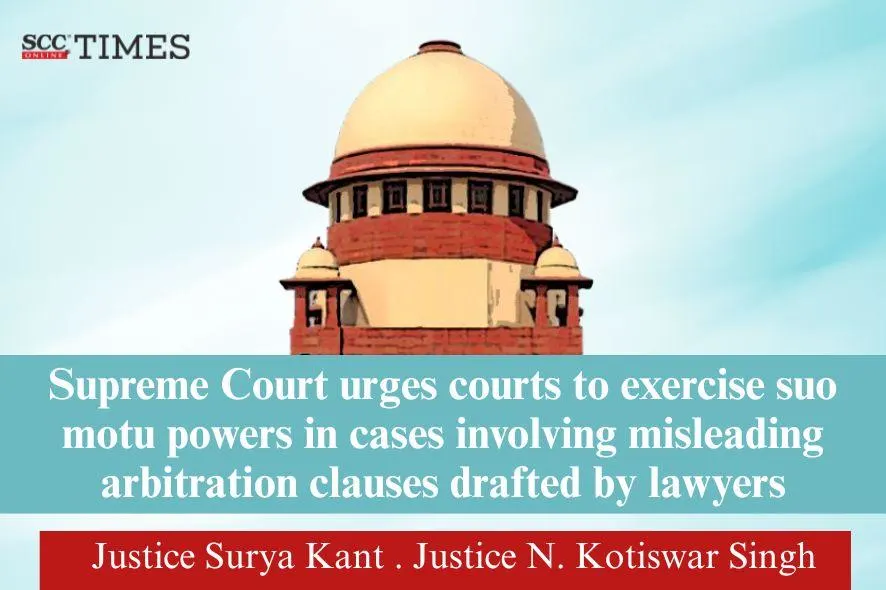Supreme Court: In a batch of appeals challenging judgments passed by the Delhi High Court, in three separate proceedings pertaining to multiple Concession Agreements executed between the Municipal Corporation(s) of Delhi and various private contractors for the development of parking and commercial complexes, the division bench of Surya Kant* and Nongmeikapam Kotiswar Singh, JJ. emphasised the need for courts to invoke their suo motu powers in cases where legal professionals are found deliberately drafting misleading arbitration clauses. The Court pointed out that the time is near when personal liability may need to be assigned for such unscrupulous actions, coupled with the imposition of stringent punitive measures.
Further, the Court held that Article 20 of the Concession Agreements executed in all three appeals does not form an arbitration agreement and, as such, cannot be brought under the purview of the Arbitration Act. Consequently, the following rulings were made:
-
The impugned judgments of the High Court in the cases of SMS Ltd. and CCC Ltd. Were set aside.
-
The impugned judgment of the High Court in the case of DSC Ltd. Was upheld.
-
It was clarified that the parties involved in all three appeals are at liberty to pursue their alternative remedies in accordance with the law.
Background
The central issue in each case pertains to the interpretation of the dispute resolution clauses in these agreements, specifically whether they constitute an arbitration clause, thus rendering the disputes arbitrable. This alleged ambiguity has led to protracted litigation across multiple forums.
The private contractors asserted that these dispute resolution clauses necessarily mandate arbitration; whereas the Municipal Corporations contend that they be construed as those prescribing mediation.
Issue
Whether the dispute resolution clauses viz. Article 20 in the subject-Concession Agreements, constitute a valid arbitration agreement between the parties.
Analysis and Decision
What are the ingredients of an arbitration agreement?
The Court took note of Section 7 of the Arbitration and Conciliation Act, 1996 and highlighted the essential components of a valid arbitration agreement, including its genesis and structure. The Court emphasised that the existence of a defined legal relationship, whether contractual or not, is crucial in determining the applicability of arbitration law. Additionally, Section 7 stresses the importance of the form and documentation of the agreement, ensuring clarity and certainty in arbitral arrangements.
The Court observed that the statutory requirement for the agreement to be in writing, whether through a formally signed document, an exchange of communications, or even unchallenged pleadings, reflected the Legislature’s intent to accommodate the realities of modern commercial communication, including electronic correspondence. Another important feature was found in sub-section (5), which broadened the definition of ‘arbitration clause’ by expressly allowing for incorporation by reference. This statutory approach prioritized substance over form in the context of valid arbitration agreements, which ultimately led to an arbitral award that was enforceable under Section 36 of the Arbitration and Conciliation Act, 1996.
The Court highlighted that the structure of valid arbitration agreements across jurisdictions reveals a broadly consistent understanding of arbitration, with Indian law largely aligning with international norms derived from the United Nations Commission on International Trade Law (UNCITRAL) Model Law on International Commercial Arbitration, 1985. This Model Law has significantly influenced arbitral legislation worldwide. After a limited comparative analysis, the Court noted that the legislative frameworks globally share common elements governing arbitration agreements, including a written agreement, a defined legal relationship, and a clear commitment to submit present or future disputes to arbitration.
Considering the global position on the validity of arbitration agreements, along with the settled law in India, the Court found that the existence of an arbitration agreement necessarily requires the presence of the following ingredients:
-
Clear Intent to Arbitrate:
The agreement must reflect a mutual and definitive intention to resolve disputes through arbitration, excluding civil courts’ jurisdiction. This consensus must be evident from the form and substance of the agreement, ideally documented in a tangible medium.
-
Binding Adjudicatory Process:
The arbitration agreement must provide for a binding resolution, culminating in a final and enforceable award, not a non-binding recommendation or mediation outcome.
-
Compliance with Arbitration Norms:
While statutory requirements may not always mandate specific details like seat or procedural rules, best practices encourage clarity to ensure legal certainty. The agreement should allow party autonomy in appointing arbitrators and conducting proceedings, subject to statutory safeguards. It must also ensure an impartial adjudicatory process, adhering to principles of natural justice.
The Court clarified that all the elements identified above must co-exist and be duly proven by the party asserting the existence of an arbitration agreement. Consequently, it was clarified that a dispute resolution clause can only be considered a valid arbitration agreement when it reflects a clear intent to arbitrate, involves a binding adjudicatory process, and complies with general arbitral norms.
Does Article 20 of the subject-Concession Agreements constitute an arbitration agreement?
Taking note of the dispute resolution clauses in all three Concession Agreements, the Court observed that Article 20 in the cases of DSC Ltd. and CCC Ltd. are identical in all material respects, while the clause in the case of SMS Ltd. differs slightly.
The Court noted that, firstly, the dispute resolution clauses in the cases of DSC Ltd. and CCC Ltd. include specific sub-provisions regarding the ‘mediation’ process, while the SMS Ltd. agreement prescribes only a summary procedure. Secondly, the stipulation allowing for the appointment of an officer ‘from within or without MCD’ appears only in the SMS Ltd. agreement, and was notably absent in the clauses of DSC Ltd. and CCC Ltd. Thirdly, the latter two agreements expressly state that the officer’s decision shall be ‘final and binding,’ a provision missing in the SMS Ltd. version.
Having reviewed these differences, the Court now turned to assessing the clauses considering the legal principles established regarding valid arbitration agreements.
Intent to Arbitrate
The Court stated that the first and foremost requirement for an arbitration agreement is that the parties must consciously and unambiguously agree to submit their disputes to arbitration, which must be evident from the language of the contract.
A plain reading of Article 20 in all three Concession Agreements reveals no express intent to arbitrate for the following reasons:
-
The clause is titled ‘Mediation by Commissioner,’ which raises confusion about the mode of dispute resolution. Although judicial precedents allow flexibility in nomenclature, such ambiguity cannot be justified, as it implies a non-adjudicatory and conciliatory process, not arbitration.
-
The absence of the terms ‘arbitration,’ ‘arbitrator,’ or even ‘Arbitration Act’ in the dispute resolution clauses further suggests that arbitration was not intended.
-
The reference to the ‘Commissioner, MCD,’ instead of an arbitral tribunal or independent adjudicator, indicates an internal dispute resolution mechanism rather than an external arbitration forum.
-
The procedural steps in the DSC Ltd. and CCC Ltd. agreements, such as document requests and interviews, do not alter the nature of the process, which remains an administrative fact-finding exercise rather than arbitration.
-
Additionally, the appointment of the decision-maker is solely within the control of MCD, with no input from the other party, further weakening the claim of an arbitration framework.
Final and Binding Nature
The Court noted that the private contractors argued that the decision rendered under Article 20 is ‘final and binding,’ making it akin to an arbitral award. While an arbitration clause must lead to a conclusive determination, finality alone does not make it arbitration. In SMS Ltd., the term used is ‘final,’ not ‘final and binding,’ which is found in the cases of DSC Ltd. and CCC Ltd. A surface-level analysis suggests that Article 20 across all cases seems to meet this requirement; however, this does not affect the outcome of the cases.
The Court further emphasised that other forms of decision-making—such as expert determinations, departmental adjudications, and administrative reviews despite being final and binding, do not automatically constitute arbitration. The task of determining the appropriate category for these cases lies beyond the scope of these appeals.
Compliance with Arbitral Norms
The Court highlighted that if a clause does not align with the best practices of contemporary arbitration, it will generally be unworkable and essentially a dead letter. This also includes compliance with the Arbitration Act and its subsequent amendments.
It was clarified that there is no fixed formula for exhaustively listing arbitral norms, as these norms may evolve over time. While a comprehensive list of arbitral norms cannot be provided, the Court identified several key norms relevant to these appeals, which unfortunately are neither explicitly nor implicitly addressed in the dispute resolution clauses.
Party Autonomy in Arbitrator Appointment
The Court noted that in the present appeals, the officer deciding the dispute(s) was appointed exclusively by MCD/SDMC, with no input from the other contracting party, i.e., the private contractors. In contrast, valid arbitration agreements typically provide for a mutually agreed-upon arbitrator or an independent appointing authority, such as a court or an arbitral institution, to ensure compliance with the established principles of bi-partisanship and equality.
Adversarial Process
The Court opined that Article 20 lacks essential elements of arbitration. It was acknowledged that there are no provisions for (i) oral hearings, (ii) examination and cross-examination of witnesses, or (iii) the application of formal rules of evidence or procedure in the impugned clauses. The appointed officer merely reviews written submissions and may request additional documents or conduct interviews.
The Court held that Article 20 lacks the judicial element that gives arbitration its unique credibility as an adjudicatory mechanism, distinct from other forms of dispute resolution. By omitting crucial procedural safeguards, such as adversarial proceedings and impartial adjudication, the clause fails to meet the necessary requirements for arbitration and cannot be upheld as such.
Neutrality and Independence of the Arbitrator
After referring to South Delhi Municipal Corporation v. SMS AAMW Tollways (P) Ltd., (2019) 11 SCC 776 , the Court emphasised that the principles of natural justice must be inherent in any judicial process, even if it was pseudo-judicial. This was why it was crucial for the arbitrator to be impartial in any arbitration agreement. If this requirement was not met, the dispute resolution process could not be considered ‘arbitration.’
The Court noted that under Article 20, the decision-maker was an officer of MCD, which inherently biased the process in favor of the Municipal Corporation(s). The clause did not even stipulate that the officer be legally qualified, further questioning the legitimacy of the decision-making process. Moreover, while Article 20 in the SMS Ltd. case at least allowed for the officer to be from ‘within or without MCD,’ the clauses in DSC Ltd. and CCC Ltd. entirely removed even this minimal provision for impartiality, allowing MCD to unilaterally select a decision-maker from within its own ranks, undermining the neutrality required for an adjudicatory process.
The Court concluded that a holistic analysis of Article 20 across the subject Concession Agreements led to the inescapable conclusion that it did not meet the requirements of an arbitration agreement under Section 7 of the Arbitration Act. While certain textual elements, such as the use of the phrase ‘final and binding’ in the cases of DSC Ltd. and CCC Ltd. may have superficially resembled arbitration, a deeper examination revealed that the clause was procedurally and structurally deficient in ways that rendered it incapable of functioning as an arbitration clause in law.
The Court said that Article 20 lacked the judicial element that gives arbitration its distinct credibility as an adjudicatory mechanism. It was neither an arbitration clause in letter, nor in spirit or effect. Its ambiguity and lack of procedural integrity had, in fact, led to increased litigation rather than the expeditious resolution that arbitration was meant to provide, thereby undermining the very purpose of arbitration.
Accordingly, the Court held that Article 20 did not constitute an arbitration agreement under the Arbitration Act. The impugned judgments of the High Court in the cases of SMS Ltd. and CCC Ltd., which construed it as such, were set aside. The view taken in DSC Ltd. in the judgment which correctly rejected arbitration, was affirmed.
The Court made several important observations regarding the state of arbitration agreements within the Indian legal landscape before concluding these appeals.
The Court acknowledged how rapidly the Indian legal ecosystem has evolved to accommodate arbitration, emphasising that both the Indian Legislature and Judiciary have worked together to ensure efficient regulation of the arbitral process with minimal judicial intervention. However, the Court noted that significant work still remains to be done.
-
Deficiencies in Drafting Arbitration Clauses:
The Court pointed out that despite arbitration being introduced as a mechanism to ensure swift and effective dispute resolution, the reality in certain cases is that the process has been misused, complicating and prolonging disputes. Ambiguities embedded in arbitration clauses in commercial agreements raise serious concerns. The Court questioned whether these issues arose from administrative oversight or deficient legal advice, noting that this was a matter for separate consideration.
-
Parties Involved:
The Court observed that the parties involved in these appeals were not disadvantaged individuals but rather well-resourced organizations, one being a statutory civil body in the National Capital Region, and the other being prominent contractors with the means to hire top-tier legal counsel. This made the prolonged litigation over a simple issue, the mode of dispute resolution—particularly egregious.
-
Delay in Dispute Resolution:
The Court expressed its frustration at the prolonged litigation process over the method of dispute resolution, leaving the actual substantive issues unresolved. The metaphor used by the Court described the situation as a traveler stranded at a crossroads, endlessly debating the path to take without beginning the journey itself. This delay, in the Court’s view, represented a failure of justice, not due to the lack of resolution, but due to a lack of decision on how to resolve the dispute.
-
Wastage of Judicial Time:
The Court condemned the waste of judicial time caused by poorly drafted arbitration clauses. It stressed the importance of precision and clarity in drafting arbitration clauses and called on legal professionals to ensure that such clauses are not ambiguous or convoluted. The Court warned that indulging in such practices was detrimental to the legal profession and urged legal counsel to avoid such behavior.
-
Judicial Responsibility:
The Court urged the judiciary to take a more proactive role in rejecting poorly drafted clauses at the earliest stages. The Court emphasised that cases where arbitration clauses are ambiguous or appear to be drafted in bad faith should be dismissed outright. Furthermore, the Court suggested that courts should use their suo moto powers to take action against legal professionals who deliberately design misleading arbitration clauses.
-
Potential Personal Liability for Legal Professionals:
The Court indicated that the time may soon come when legal professionals who intentionally draft flawed or misleading arbitration clauses could face personal liability and be subject to severe punitive measures. The Court strongly believed that such steps would help infuse integrity, transparency, and professionalism into Indian arbitration law.
In conclusion, the Court reiterated that to uphold the integrity of the arbitral process, the sanctity of arbitration agreements must be preserved, and a more rigorous approach is needed in ensuring their clarity and fairness.
CASE DETAILS
|
Citation: Appellants : Respondents : |
Advocates who appeared in this case For Petitioner(s): For Respondent(s): |
CORAM :





